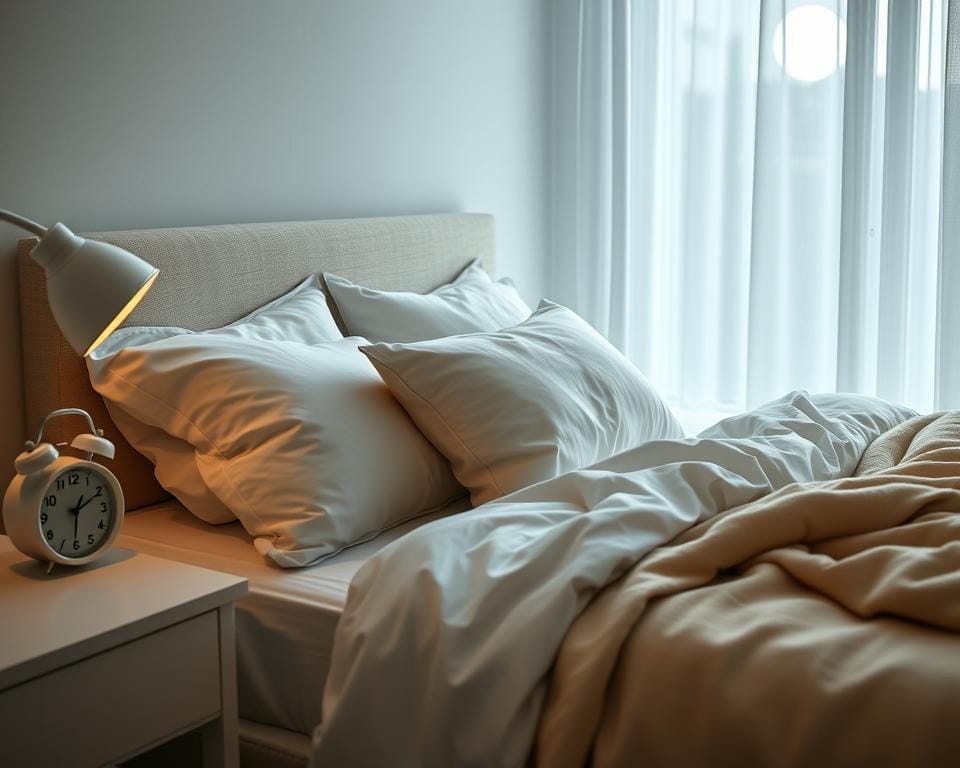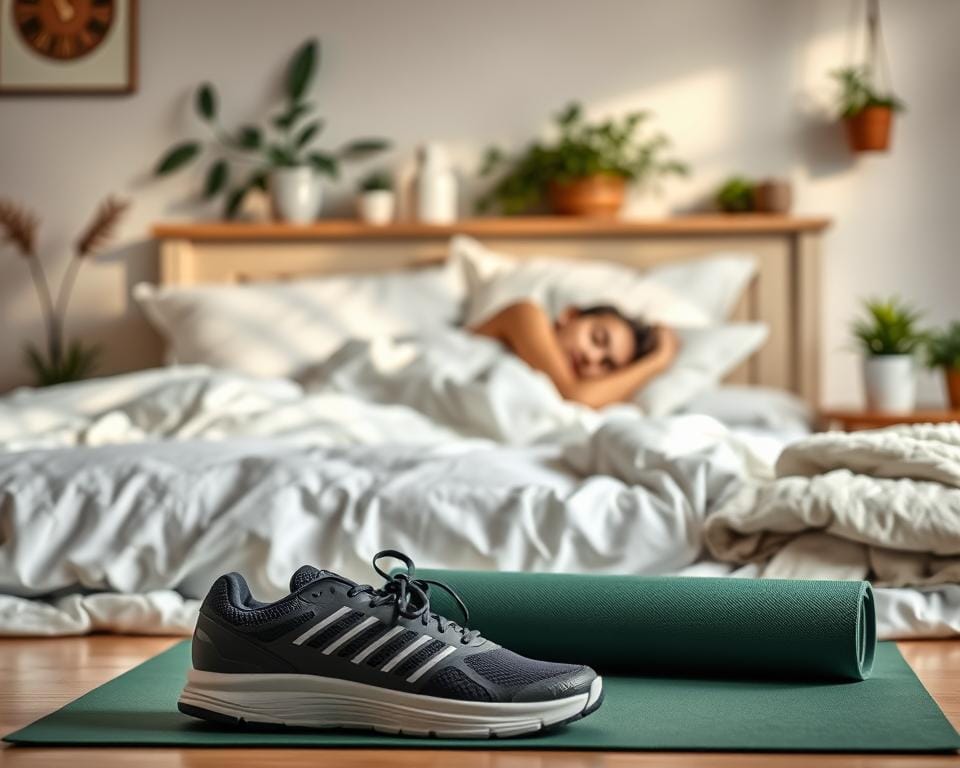Did you know that 30 minutes of moderate exercise can improve your sleep quality that night? It’s true! Our daily habits greatly affect our sleep. I’ve found that a good bedtime routine is essential for a restful night.
Good sleep quality and a regular sleep schedule are vital for our health. I’ve learned that a proper sleep routine is more than just going to bed at the same time. It’s about creating a whole approach to sleep that gets both body and mind ready for rest.
My journey to better sleep showed me the value of a structured bedtime routine. This routine, lasting 30-60 minutes before bed, tells our brains it’s time to relax. It’s amazing how our bodies can learn to feel tired at bedtime with consistent habits.
One key sleep hygiene practice I’ve adopted is setting a consistent bedtime and wake-up time, even on weekends. This helps our internal clock, improving sleep quality and length. Starting my wind-down routine an hour before bed greatly improves my sleep.
In the next sections, we’ll look at creating the best sleep environment, fine-tuning your sleep routine, and how lifestyle affects sleep. Whether you’re a night owl or want to wake up earlier, these tips can help you sleep better.
Creating the Perfect Sleep Environment
Turning your bedroom into a sleep oasis is essential for quality rest. Let’s look at how to make your sleep space the best it can be.
Optimising Bedroom Temperature and Ventilation
The perfect bedroom temperature for sleep is about 65°F (18.3°C). This cool air helps you sleep better. If it’s too cold, just add another blanket.
Good air flow is also important. Open a window or use a fan to keep the air moving and fresh.
Managing Light and Noise Levels
Light can mess with your sleep. Use blackout curtains to make your room dark. They block out streetlights and morning sun, helping you sleep better.
Noise can also disturb your sleep. A white noise machine can help. It offers sounds like rain or ocean waves to create a calm atmosphere.
Selecting Comfortable Bedding and Mattress
Your bed is the heart of your sleep space. Choose a mattress that supports your body well. Mattresses should be replaced every 7-10 years.
Use soft, breathable bedding too. Cotton sheets are great for their comfort and ability to breathe.
By focusing on these areas, you can make a sleep environment that helps you rest well. Enjoy your peaceful nights and fresh mornings!
How to Improve Your Sleep Routine
Getting a good night’s sleep is vital for your health. A regular sleep schedule helps your brain know when it’s time to sleep. This aligns with your natural body clock. Let’s look at some ways to improve your sleep routine and get better rest.
Establishing Consistent Sleep and Wake Times
Having set times for sleeping and waking is important. Try to sleep for at least seven hours each night. If you need to change your schedule, do it in small steps of 15 minutes. Keep your sleep schedule the same, even on weekends, to stay consistent.

Developing a Pre-Sleep Ritual
A bedtime routine tells your brain it’s time to relax. Here are some calming activities:
- Take a warm bath an hour before bed
- Listen to calming music or ambient sounds
- Practice deep breathing exercises
- Read a book with a simple plot
- Journal or make a to-do list
Stay away from heavy meals, alcohol, and screens before bed. They can mess up your sleep. Instead, have a light snack like fruit or yoghurt if you’re hungry.
Managing Weekend Sleep Patterns
Stick to your usual sleep times on weekends, within an hour. This keeps your body clock in sync. It helps your mental health and metabolism. If you need to change your schedule, do it slowly to avoid upsetting your sleep.
By following these tips, you can make your bedroom a sleep haven. Remember, your bed should only be for sleeping. It should be a calm place for rest.
Lifestyle Habits That Impact Sleep Quality
Your daily routines are key to good sleep. Let’s look at some lifestyle factors that affect sleep quality.
Exercise and Physical Activity Timing
Exercise and sleep are linked. Doing physical activity during the day can improve sleep. Try 30 minutes of moderate exercise, five times a week. This can help you sleep better and deeper.

But, timing is important. Avoid hard workouts before bed. They can make it hard to relax. Instead, do light stretching or yoga in the evening.
Dietary Considerations for Better Sleep
Eating right can greatly improve sleep. Choose a Mediterranean diet with lots of veggies, fruits, and healthy fats. This diet can help you sleep faster and longer. Avoid big, spicy, or fatty meals before bed.
If you’re hungry, have a light snack with carbs and protein.
Managing Caffeine and Alcohol Consumption
Caffeine affects sleep quality. Its effects last 3-7 hours after drinking. So, cut down on caffeine, mainly in the afternoon and evening.
Alcohol might make you sleepy but can mess with your sleep cycle. For better sleep, avoid alcohol before bed.
Changing your lifestyle takes time. Be patient and keep up with your new habits. This way, you’ll see better sleep quality over time.
Technology and Sleep Management
In our digital age, managing technology’s impact on sleep is key. With many devices in UK homes, screen time can disrupt sleep. Let’s see how tech can help improve our sleep, not harm it.
Digital Device Curfew Times
Setting a digital curfew has changed my life. About 70% of adults use devices in bed, which can mess with sleep. I now turn off devices an hour before bed. This helps my brain relax and improves my sleep.
Using Sleep-Tracking Apps Effectively
Sleep apps can be great if used right. I’ve tried different trackers that monitor sleep stages and room temperature. Some even adjust mattress firmness based on your position! But I don’t get too caught up in the data. I use it to tweak my sleep space.
Implementing Blue Light Filters
Blue light from screens can stop melatonin production, making sleep hard. I use blue light filters on all devices, which start as evening comes. For late-night device use, I wear blue light blocking glasses. This small change has greatly improved my sleep.

